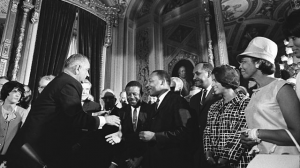
President Lyndon B. Johnson meets with Martin Luther King, Jr. on Aug. 6, 1965 upon signing the Voting Rights Act. Photo: Yoichi R. Okamoto, Lyndon Baines Johnson Library and Museum
This post originally appeared at The Nation.
In the past four years, under the leadership of Chief Justice John Roberts, the Supreme Court has made it far easier to buy an election and far harder to vote in one.
First came the Court’s 2010 decision in Citizens United v. FEC, which brought us the super PAC era.
Then came the Court’s 2013 decision in Shelby County v. Holder, which gutted the centerpiece of the Voting Rights Act.
Now we have McCutcheon v. FEC, where the Court, in yet another controversial 5-4 opinion written by Roberts, struck down the limits on how much an individual can contribute to candidates, parties and political action committees. So instead of an individual donor being allowed to give $117,000 to campaigns, parties and PACs in an election cycle (the aggregate limit in 2012), they can now give up to $3.5 million, Andy Kroll of Mother Jones reports.
The Court’s conservative majority believes that the First Amendment gives wealthy donors and powerful corporations the carte blanche right to buy an election but that the Fifteenth Amendment does not give Americans the right to vote free of racial discrimination.
These are not unrelated issues—the same people, like the Koch brothers, who favor unlimited secret money in US elections are the ones funding the effort to make it harder for people to vote. The net effect is an attempt to concentrate the power of the top 1 percent in the political process and to drown out the voices and votes of everyone else.
Consider these stats from Demos on the impact of Citizens United in the 2012 election:
· The top thirty-two Super PAC donors, giving an average of $9.9 million each, matched the $313.0 million that President Obama and Mitt Romney raised from all of their small donors combined — that’s at least 3.7 million people giving less than $200 each.
· Nearly 60 percent of Super PAC funding came from just 159 donors contributing at least $1 million. More than 93 percent of the money Super PACs raised came in contributions of at least $10,000 — from just 3,318 donors, or the equivalent of 0.0011 percent of the US population.
· It would take 322,000 average-earning American families giving an equivalent share of their net worth to match the Adelsons’ $91.8 million in Super PAC contributions.
That trend is only going to get worse in the wake of the McCutcheon decision.
Now consider what’s happened since Shelby County: eight states previously covered under Section 4 of the Voting Rights Act have passed or implemented new voting restrictions (Alabama, Arizona, Florida, Mississippi, Texas, Virginia, South Carolina, and North Carolina). That has had a ripple effect elsewhere. According to The New York Times, “nine states [under GOP control] have passed measures making it harder to vote since the beginning of 2013.”
A country that expands the rights of the powerful to dominate the political process but does not protect the fundament rights of all citizens doesn’t sound much like a functioning democracy to me.


